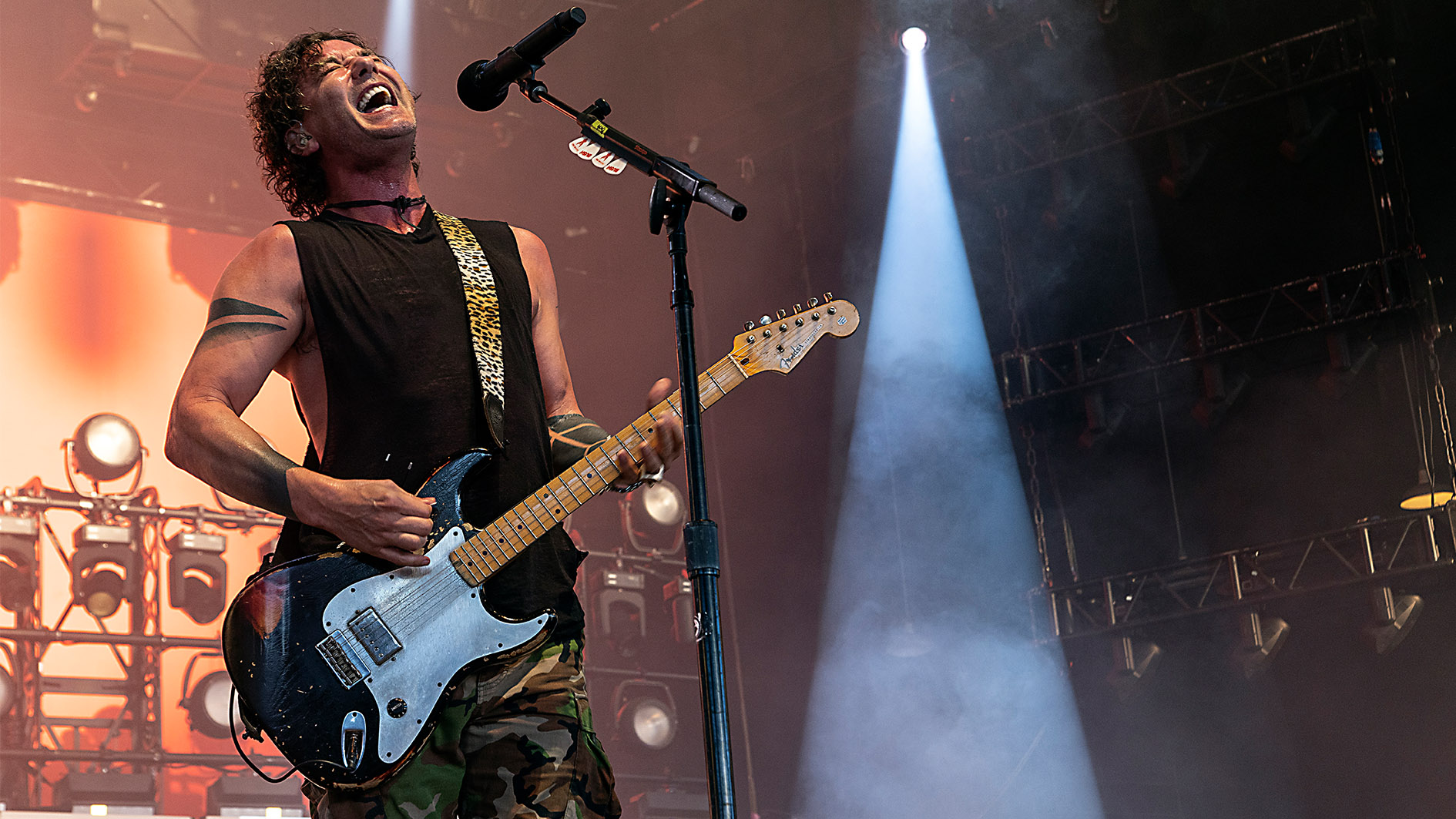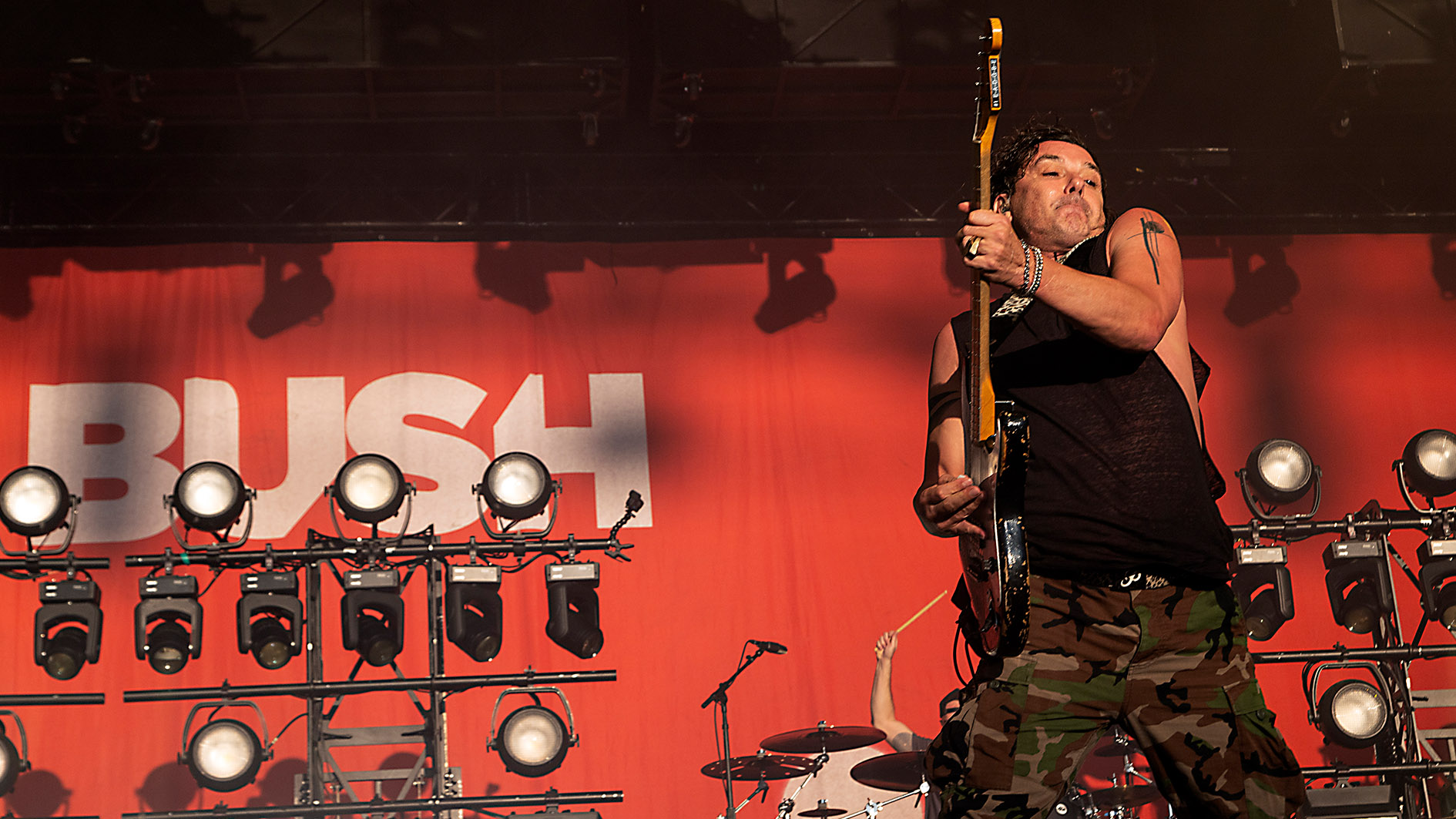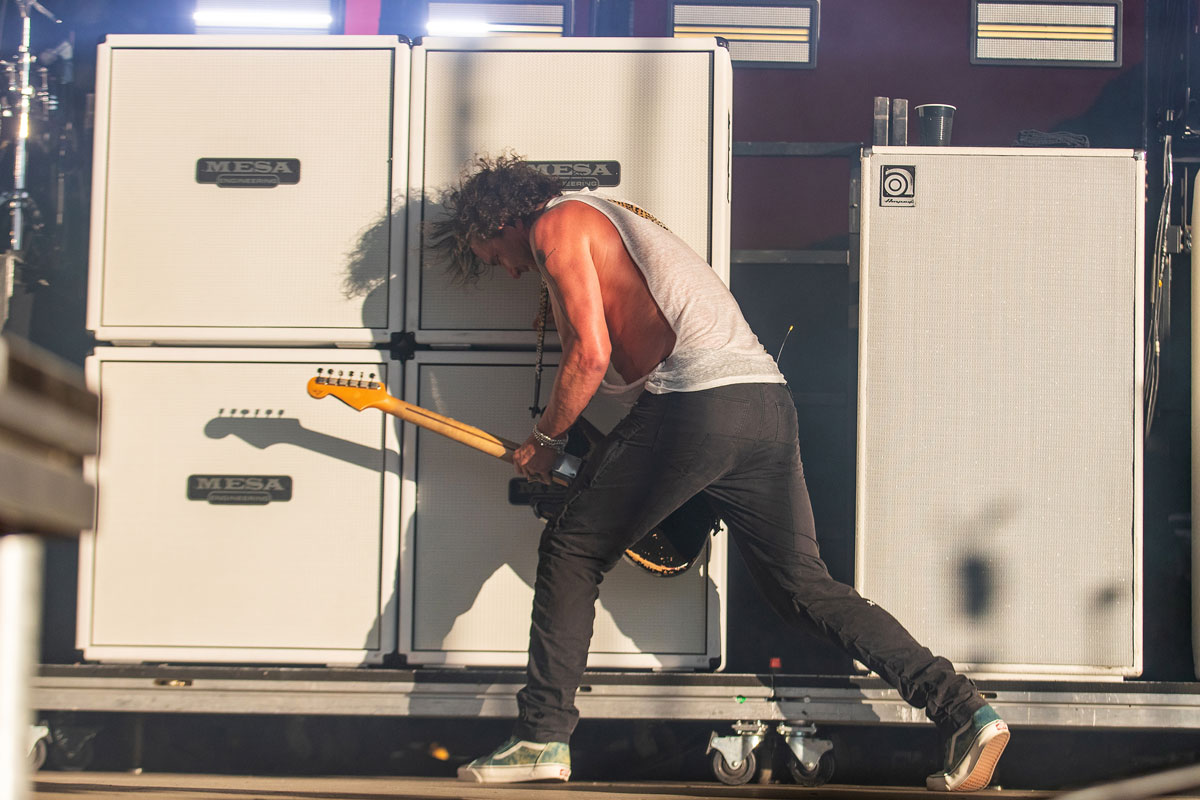Gavin Rossdale: “Modern tones are where it's at – and if you're not where it's at, where are you?”
The Bush frontman on how he engineered the band's heaviest album yet using Neural DSP amp sims, his surprising history with Joe Walsh’s ‘Hotel California’ Jazzmaster and the tone tips he received from Carlos Santana

When we tell Gavin Rossdale that the new Bush album, The Art Of Survival, feels like their heaviest record to date, he seems genuinely pleased.
Though the quartet have clearly created and stuck to their own sonic formula for this latest body of work, comparisons to more metallic bands like Deftones, Nine Inch Nails and Tool are more than welcome, it seems...
“That’s music to my ears and I appreciate your analysis because it’s everything I wanted to do this time round,” says Rossdale, speaking to Guitar World from his hotel room in Milwaukee, where his band will be performing as special guests to Alice In Chains and Breaking Benjamin the following night, the three-band bill then making its way through North America for another six weeks or so after that.
“This is an exciting conversation to have, the kind that vibes you up in a good way,” he smiles. “I think I’m getting better at writing and a lot of bands and records from that metal world have really inspired me. But I’ve never wanted to betray how I sing, because it’s natural. I’m not trained or anything like that. That’s why this album feels like such an interesting mix.”
He also explains how a band in their position don’t really need to pander to anyone but themselves: they’re doing what they love, first and foremost. Diluting it down for the masses would be a waste of time for all concerned.
“The tried and tested route for a band like us would be to make a record that was the opposite of everything you just said and more melodic. And it would probably be acceptable, all milk goes bad and things move on.
“But I feel like an MMA fighter in the Octagon [laughs]. I refuse to leave, and the only way to stay is to be fierce and modern. If I don’t do that, then I have to accept my fate. Modern tones are where it’s at and if you’re not where it’s at, where are you?”
Get The Pick Newsletter
All the latest guitar news, interviews, lessons, reviews, deals and more, direct to your inbox!
While few would deny the quartet’s last album, 2020’s The Kingdom, also packed its fair share of earth-shaking riffs, this latest body of work takes Bush to their most distorted and down-tuned. Most of it, Rossdale explains, is in drop C – though there are a couple of tracks that were taken as low as drop B.
“Some people like to bark and scream heavily,” reasons the singer/guitarist. “Though I tend not to, I made a heavy backing for this album because I noticed over the years, as the live thing took precedence over everything else, we’d be playing metal bills, heavy rock bills, sometimes alternative bills but not really any pop bills.
Even if you don’t know me or any of my music, I want to fuck you up with my riffs!
“I like to go through all the records and choose all the detuned songs to fuck people up. Even if you don’t know me or any of my music, I want to fuck you up with my riffs!
“So we’d often play songs like Loneliness Is A Killer [from 2014’s Man On The Run] or Disease Of The Dancing Cats [from 1999’s The Science Of Things]. I don’t believe in regrets. Fuck regrets. I don’t believe in them. There was a time in my life where I did and it just caused pain. There’s no function for regret.
“When I made that Institute record in 2005, I did ended up having a regret, because it probably should have been a Bush album. I missed playing those old songs. In the end, I just decided to go for it and bring the band back. This album feels like Bush 2.0, 3.0, 16.0… whatever you want to call it. The music feels very vital.”
What’s the reaction been like to the new songs on this current run?
“We’re like a baby band right now because we’re playing at 6:25pm, while Alice In Chains go on at 9:15pm. But we still have 12,000 people in there to start with. It’s a good tour to take. Alice In Chains are a great band, so are Breaking Benjamin. There are a lot of good people on this tour. We keep playing at sunset, when it’s still super-hot and humid.
“We’re playing a few hits but mainly newer stuff that’s heavy. The kids might hear a song like The Sound Of Winter or The Chemicals Between Us and say ‘I know that song, it was Number One for 10 weeks!’
“Or they might be kids wondering who we are, so we’ll play a track like Blood River from the last album which is super-heavy and riff-driven. It can get 15,000 people going nuts, even if they don’t know the song.
“In the past, there was too much safety in our sets. It felt like we were just playing the greatest hits, which is ironic for a band that have never brought out a greatest hits album. Now at this point in my career, I lean less on the hits and more on the exploratory.”
I’m English, so who cares about The Eagles, really? I don’t give a fuck about The Eagles, but I can respect them even if I don’t listen to them
One of your main guitars over the years has been a Fender Jazzmaster that once belonged to Joe Walsh from The Eagles – which you later learned had been used for the rhythm parts on Hotel California. That must have been quite mind-blowing!
“Yeah! So I bought that guitar from Vintage And Rare, this fantastic guitar store in London. As a kid I used to go in there with no money. I was one of those annoying customers who would never buy anything, so when I signed a record deal, I went there and bought a guitar. I tried every guitar in there.
“The Jazzmaster was in the window, funnily enough. I’d seen PJ Harvey playing one in Finsbury Park when she had that first record, Dry, come out. She was playing a Jazzmaster through a Marshall.
“I knew I loved the look of the purple Jazzmaster in the window but I wouldn’t let myself buy the first thing I saw, I had to try every guitar in the store. I came back to the Jazzmaster and it sounded great.
“They told me Joe Walsh had previously owned it. I’m English, so who cares about The Eagles, really? I don’t give a fuck about The Eagles, but I can respect them even if I don’t listen to them. Everyone else was freaking out about it but it didn’t really mean much to me.”

So how did you end up meeting Joe and verifying its history?
“I was actually being managed by their manager for a long time. So when I met Joe, I asked if he knew this guitar. He picked it up and started playing it, and then said ‘Yeah, I actually used it for the verses on Hotel California!’
“So I got him to sign a bit of paper to prove it and I told my kids to sell it the day I die – because I’d used it on Sixteen Stone, which has some history, but the massive bit of history is the fact that it had been used on Hotel California. And of course I respect that, even if I don’t care about it personally.
“People know a bit about the story, but here’s something I’ve never told anyone and it’s brilliant. I sent the guitar over for Joe to verify and look over with his tech, who has probably been with him since forever.
“And he sent it back signed with his name on the actual guitar. As soon as I saw it, I had to get that shit off! I’m a professional musician! I don’t give a shit, this is just for my kids to sell when I’m dead… wake up, I don’t care [laughs]!”
This record is the first time I’ve engineered myself, recording sections and programming different things. The Neural DSP stuff made it so easy
What are we hearing on the new album in terms of amps?
“This record is the first time I’ve engineered myself, recording sections and programming different things. The Neural [DSP] stuff made it so easy. I have the Gojira plugin, the Tim Henson one, as well as the Tosin [Abasi] and Plini ones [all Archetype amp modelers]. They already sound great to start with, but I’d start tweaking things here and there to build my own tones that suited my guitars.
“The writing process was similar to when I wrote The Science Of Things in Ireland. I’d write for 10 days, usually when I have my kids but while they’re at school. I’d mess around during the day and find pieces of different things.
“A week later, I’d start putting it all together. I’m not interested in recording myself singing, being a one-man band with cymbals behind my back. It’s just not necessary.
“Engineering my guitars, however, is a skill and I found the DSPs really fun to get into. I had such a good time creating all these tracks myself. I’d done it before with an engineer – the poor fucker would have to sit there from midday to 10pm while I smoke joints and shut my eyes playing different riffs [laughs].”
So does that mean you didn’t use any pedals, either?
“We didn’t need to. Even though there are so many different distortions and fuzz pedals you can get. But I really try not to rely on them. I have four boxes and really great pedals, though I end up leaving them in there.
“The bottom line is that the Neural stuff already sounds so good, it just doesn’t need it. There’s a reason why I’d only used Axe-Fx live. It was never quite as good as blending three or four amps.
“The DSP plugins, on the other hand, can do that – which has saved me a lot of time, thanks Neural! We even used the bass plugins, too. I had so much fun messing around and trying to get good at engineering, learning how to fine-tune it all. So look out, engineer world! On the next record I’ll be doing everything like some sort of recording addict.”
Learning how to engineer yourself must have felt very liberating.
“It was very freeing, yes. I would go through a little Universal Audio Apollo two-in and two-out unit going into my laptop. But I’ve put some panels in my bedroom and taken out the cupboards for a vocal booth; it’s all tricked out with different colors – with a piano in there right by the window. It now looks like Lenny Kravitz’s studio!
I have a wine cooler because I’m really uptown and fancy now. That’s where I keep the Jazzmaster and my Goldtop, and maybe a couple of other nice guitars
“Then I’d take what I’d done to our producer Erik Ron and he’s a ridiculous programmer. He’s so quick, it’s annoying! We’d go into pre-production, he’d help me add the right fills and get everything right. Once I’ve turned a few riffs into a song, I don’t need to do much more because I’ve got an amazing drummer. So teaching myself to get good was partly inspired by Erik. It’s a fun process.”
We also heard you’re in the process of launching a cooking show where there’s a wine fridge with guitars in it?! Please explain...
“I’m trying to get a TV show made called Eat With Gavin Rossdale, and it’s me interviewing celebrities. I’ve done two pilots and we’ve been trying to get a deal over the last couple of years. Apparently we’re really close now, so there are shoots planned for November.
“What happens is people come over to my house, I cook for them, fill them with alcohol and ask them for stories about their life. I have a wine cooler because I’m really uptown and fancy now.
“So that’s where I keep the Jazzmaster and my Goldtop, and maybe a couple of other nice guitars. The temperature is consistent, there are no fluctuations, so the guitars are happy.
“Once I left my Jazzmaster at the studio in my old house in LA, and it got so hot the air conditioning went off and the neck baked and bent. It’s the temperature for red wine, so around 68 degrees. It’s not freezing – it’s just consistent so there’s no fuckery on the neck.”

Okay, so now you have to tell us more about this Goldtop!
“The Goldtop was a weird triumph that was unintended. I went to Ireland to write The Science Of Things and rented a house for four months just for the writing. When I left LA, I went to Guitar Center and bought a really beautiful white Jazz Bass from 1966. I don’t really play Les Pauls, but I figured I should probably have one because it’s a classic guitar loads of other musicians have used.
“This Goldtop was a lot of money, like half the price of a small Nissan, I think it was around £22,000. I’d never spent that kind of money on anything. Now, of course, I look like Warren Buffett playing it but I didn’t mean to!
“Our other guitarist, Chris Traynor, is the ridiculous guitar head. I sort of like the idea of having more, but then I look at Tom Morello who has had the same guitar, pedals and amp the whole time. It’s just a conduit, or a vessel. It just comes down to what you put through it.
Carlos Santana had nothing but a switcher for two different amps, there were no pedals. I had to ask him how he got his tone and of course he told me it was all in the fingers!
“I remember when I played with Carlos Santana – excuse the namedrop but it’s a good story – I’d sung on his record and we performed together in Vegas. I sang Bang A Gong (Get It On), the [Marc] Bolan track, and had a lot of fun playing with him on stage.
“He said many great things to me, but I remember we talked about his gear. He had nothing but a switcher for two different amps – there were no pedals. I had to ask him how he got his tone, and of course he told me it was all in the fingers!”
Is there anything else of note in the collection?
“Yeah, I do have some funky guitars, like some Travis Beans, an old Firebird or an old Flying V. I have an ES-330 that’s really nice, with the cleanest and warmest tones I’ve ever heard. I didn’t get to use it that much on this record but it’s a very special guitar to me...
“The Goldtop is probably the most valuable. I don’t really know what a 330 from the '60s is worth, but it plays so beautifully. I don’t care, I’ll never sell it because it sounds so good and makes you play better. Like all of the very best guitars out there, you end up being creatively inspired by the tone you hear.”
- Bush's new album, The Art Of Survival, is out now via BMG.
Amit has been writing for titles like Total Guitar, MusicRadar and Guitar World for over a decade and counts Richie Kotzen, Guthrie Govan and Jeff Beck among his primary influences as a guitar player. He's worked for magazines like Kerrang!, Metal Hammer, Classic Rock, Prog, Record Collector, Planet Rock, Rhythm and Bass Player, as well as newspapers like Metro and The Independent, interviewing everyone from Ozzy Osbourne and Lemmy to Slash and Jimmy Page, and once even traded solos with a member of Slayer on a track released internationally. As a session guitarist, he's played alongside members of Judas Priest and Uriah Heep in London ensemble Metalworks, as well as handled lead guitars for legends like Glen Matlock (Sex Pistols, The Faces) and Stu Hamm (Steve Vai, Joe Satriani, G3).
“I suppose I felt that I deserved it for the amount of seriousness that I’d put into it. My head was huge!” “Clapton is God” graffiti made him a guitar legend when he was barely 20 – he says he was far from uncomfortable with the adulation at the time
“I was in a frenzy about it being trapped and burnt up. I knew I'd never be able to replace it”: After being pulled from the wreckage of a car crash, John Sykes ran back to his burning vehicle to save his beloved '76 Les Paul
![Bush - More Than Machines [Official Music Video] - YouTube](https://img.youtube.com/vi/-P6Vftn1490/maxresdefault.jpg)

![BUSH - Heavy is the Ocean [Lyric Video] - YouTube](https://img.youtube.com/vi/-NIjTzUcptU/maxresdefault.jpg)










